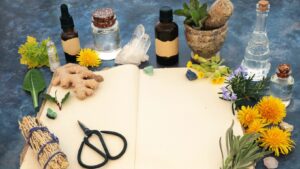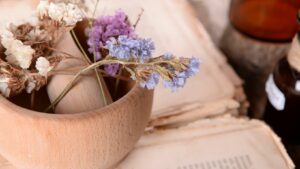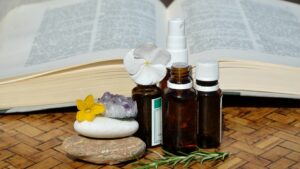In a world where modern medicine often takes center stage, the age-old wisdom of herbal remedies quietly endures. “The Lost Book of Herbal Remedies” seeks to bridge the gap between ancient practices and contemporary health needs, offering readers a comprehensive guide to natural healing. This intriguing book taps into the rich tapestry of nature’s pharmacy, presenting a treasure trove of plants and their medicinal uses.
Authored by the knowledgeable Nicole Apelian, a survival skills expert, and Claude Davis, a renowned survivalist, this guide promises to uncover the potent secrets hidden in plain sight. As people increasingly seek alternative methods for maintaining their well-being, the book’s relevance grows, drawing in those curious about holistic health. With its detailed illustrations and practical advice, “The Lost Book of Herbal Remedies” invites readers to explore the forgotten power of nature’s bounty.
The Lost Book Of Herbal Remedies Review
 “The Lost Book of Herbal Remedies” offers a detailed exploration of more than 800 plants, trees, and fungi. Readers find extensive descriptions, medicinal uses, and preparation methods for each plant. This essential resource covers both common and obscure herbs, enabling individuals to explore natural remedies widely.
“The Lost Book of Herbal Remedies” offers a detailed exploration of more than 800 plants, trees, and fungi. Readers find extensive descriptions, medicinal uses, and preparation methods for each plant. This essential resource covers both common and obscure herbs, enabling individuals to explore natural remedies widely.
Nicole Apelian and Claude Davis, the book’s authors, combine their expertise in herbal medicine and survival skills. Apelian, a renowned herbalist and survival expert, integrates her deep knowledge of plant-based remedies. Davis brings his passion for traditional survival techniques, which enriches the book’s content with practical applications.
Illustrations play a significant role, as the book contains high-quality images for easy identification of each plant. These visuals guide users in recognizing and utilizing each herb accurately. Furthermore, the book includes step-by-step instructions for creating remedies like tinctures and poultices, making it accessible to beginners and experts alike.
The book addresses modern health issues, providing natural alternatives to conventional treatments. By bridging the gap between ancient wisdom and current health challenges, the book equips readers with tools to enhance their well-being through nature-based solutions. Interest in holistic health practices spurs individuals to seek effective, natural remedies, aligning with the book’s mission to reconnect people with medicinal plants.
Benefits Of Using The Book
The Lost Book of Herbal Remedies provides valuable insights into natural healing, empowering readers to explore effective herbal treatments tailored to modern health needs.
Health Improvements
 Readers can access remedies for enhancing various health aspects, addressing conditions such as inflammation, infections, and immune support. The book details 800+ plants with medicinal properties and explains how to harness these benefits effectively. Step-by-step preparation guides for teas, tinctures, and salves make self-care accessible. By understanding plant-based solutions, individuals can adopt healthier lifestyles and reduce reliance on pharmaceuticals.
Readers can access remedies for enhancing various health aspects, addressing conditions such as inflammation, infections, and immune support. The book details 800+ plants with medicinal properties and explains how to harness these benefits effectively. Step-by-step preparation guides for teas, tinctures, and salves make self-care accessible. By understanding plant-based solutions, individuals can adopt healthier lifestyles and reduce reliance on pharmaceuticals.
Cost-Effectiveness
Natural remedies often cost less than pharmaceutical alternatives, offering financial savings. The book guides readers on remedy preparation using easily accessible plants, eliminating the need for expensive medications. Techniques for foraging and growing medicinal plants at home further reduce costs. With an emphasis on self-sufficiency, individuals can maintain health without frequent medical intervention, aligning with both budgetary and holistic health strategies.
Criticisms And Considerations
“The Lost Book of Herbal Remedies” offers a wealth of knowledge, but users have highlighted certain drawbacks and considerations that potential readers should be aware of.
Missing Information
 Some readers note that the book lacks a comprehensive index. Without an index, navigating over 800 plant entries can be challenging for those seeking specific information quickly. Additionally, while it covers numerous remedies, critics mention that it doesn’t thoroughly address potential side effects or interactions with conventional medications, which is crucial for holistic practices. Users looking for an extensive background on herbal pharmacology might find the content somewhat basic.
Some readers note that the book lacks a comprehensive index. Without an index, navigating over 800 plant entries can be challenging for those seeking specific information quickly. Additionally, while it covers numerous remedies, critics mention that it doesn’t thoroughly address potential side effects or interactions with conventional medications, which is crucial for holistic practices. Users looking for an extensive background on herbal pharmacology might find the content somewhat basic.
Complexity For Beginners
For beginners, the breadth of information can be overwhelming. The book’s dense content and variety of plants may confuse those new to herbal medicine. Step-by-step guides do simplify some processes, yet there’s a steep learning curve for identifying and using plants effectively. Beginners might benefit from supplementary resources or community support to fully harness the book’s potential.

